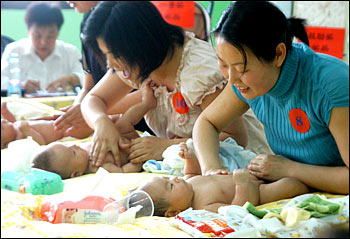| Home / Health / Health-Photo | Tools: Save | Print | E-mail | Most Read |
| One-Child Policy Desired by Younger Parents |
| Adjust font size: |
Formulated in the early 1970s, China's family planning policy encourages late marriage, late childbearing and one-child families. Now the golden time to have babies for young couples born around the 1980s is approaching.
According to Chinese government regulations, those who were both raised as single children have the right to have two babies. However, most indicate they want only one child as their parents had. A survey, recently released by the Capital Population Development Forum, asked over 1,300 Beijing couples aged between 20 and 34, all only children, about their child-rearing plans. About 51.2 percent young couples who were both raised as single children say they will not have two babies. 35.9 percent of the survey respondents responded they wanted two children, but only 26.9 percent are seriously planning it. However, the figure is higher than a similar survey four years ago when 17.5 percent said they were planning to have two babies. Ma Xiaohong, associate professor from the Population Research Institute of Beijing, explained that the new government policy is that when a single child marries another single child, the couple is entitled to have two children. In 2002, about 73.7 percent couples knew the policy, with the informed population now standing at 94 percent. "We are glad to see that more people know this policy, but only a few of them choose to have two babies. China's family planning policy is successful" she said. The economic factors, or family incomes, mainly influence people's choices, according to the surveys both in 2002 and 2007. How to look after the children has risen to second most important factor from fourth in 2002, and housing is up to third from fifth. At the same time, the political factors have gone down fifth in 2006 from their previous second place. Couples not planning to have children say they want to fully enjoy their "two-persons' world". Two-children families think that with one child in the family, he or she will feel lonely. If there are two, it could be helpful to their education. Being asked that "who influences your choice", 70 percent young couples elect themselves. About 17.1 percent say they are influenced by their spouses and 10.9 percent told they accept their parents' advice. Ma analyses that children's education, China's policies, careers, families and life quality change young couples' attitudes toward having children. Although more people choose to have two babies, the traditional concept that more children in the family makes for a happier life has quit the mainstream. A male preference has also faded in people's minds. 61.2 percent say boys and girls are the same. On the contrary to the past, 18.6 percent young couples are willing to have girls and only 15.8 percent prefer boys now. The popular view is that girls and boys are equal and the most importance is what they can do for the whole society in the future. Government statistics show that about 78,000 babies are born each year in Beijing. The research institute says there could be 140,000 newborns in 2010. Due to the current population structure and policies in China, the birth rate will rise and a baby boom will happen in Beijing. Statistics also show that China's population would be 400 million higher than it is now if the one-child family policy had not been installed. China officially announced its population reached 1.3 billion in January 2005. The peak in the birth rate will put great pressure on the government. Ma said the government should take measures in medicare, education and public facilities to adapt to the upcoming situation. She suggested that the population development should be publicized so that people can adjust their plans to avoid the baby boom. (China.org.cn by Wang Ke, January 16, 2007) |
| Tools: Save | Print | E-mail | Most Read |
 |
| Related Stories |
